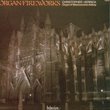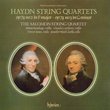| All Artists: Burgon, Chichester Choir, Suter Title: Cathedral Music Members Wishing: 0 Total Copies: 0 Label: Hyperion UK Release Date: 11/11/1993 Genres: Special Interest, Pop, Classical Styles: Vocal Pop, Opera & Classical Vocal, Sacred & Religious Number of Discs: 1 SwapaCD Credits: 1 UPC: 034571161235 |
Search - Burgon, Chichester Choir, Suter :: Cathedral Music
CD DetailsSimilar CDs |
CD ReviewsSublime Mark Swinton | 05/26/2001 (4 out of 5 stars) "One of Hyperion's earliest titles, this disc provides a fine survey of sacred music by an interesting and prolific composer.Burgon's "Nunc Dimittis" is by far the best known of his church pieces, since it was featured in the soundtrack of the television series "Tinker, Tailor" in the early 1980s. A moving setting of the Song of Simeon for treble voices and organ, in dialogue with an evocative solo trumpet, it was originally released as a single and so captivated fans of the series that it even broke into the pop charts for a while! Building upon its success, Burgon wrote a "Magnificat" (without trumpet) to produce an Evening Service. When listening to it, one might well feel that it hints at the popular music of that memorable decade whilst responding effectively to the words. Heard at the start of the programme, it makes a wonderful introduction to the rest of the music.The "Hymns to Mary" are two short motets for unaccompanied choir, setting texts from the fifteenth and sixteenth centuries. The first, "Hail Queen of Heaven," is simple and hymn-like; "Blessed be that lady bright" has more counterpoint and inner variation of the basic material. Both are remarkably gentle, as is "But they have been found again" - the title actually comes from the final line of the text. Also worth mentioning is "A Prayer to the Trinity"- nothing more need be said of this than that it is exquisite. "This world" is another motet, but with much darker and more oppressive overtones; the text is concerned with death and possible solace when faced with it. Before the final stanzas there is a climactic and disturbing organ solo that magically melts into a gentle duet for choir and organ (indeed, in this piece the organ part is for once not an accompaniment but a distinct entity offering a wordless response to the sung passages). "At the round earth's imagined corners," sets a sonnet by John Donne for - unusually - solo treble, trumpet and organ. Fleshing out the programme is the "Short Mass," in which none of the movements is more than two minutes long, and "Laudate Dominum," a setting of Psalm 148 in which the organ IS an accompaniment to some spiky choral writing.Burgon's style in all this music is to clothe his chosen texts in evocative harmonies, reminiscent at times of Peter Maxwell Davies but far milder. When distinct melodies appear (as in the two pieces with trumpet, "Nunc Dimittis" and "At the round earth's imagined corners") they float effortlessly above these characteristic harmonies like some sort of sea-spray above a coastline. Sometimes, Burgon finds a medium between the two that etches itself onto the memory - the organ ostinato in "Magnificat" is in many ways what makes that piece so haunting, just as the chord progressions and quiet 'echoes' of trumpet in "Nunc Dimittis" are haunting.As to the performance: Chichester Cathedral Choir was at the time very familiar with Burgon, having commissioned and given first performances of most of the works recorded here - "But they have been found again" was written for the Southern Cathedrals Festival and first performed at Chichester. Under Alan Thurlow, the choristers make light work of their soaring tunes and airy high notes, aided resolutely by the lay clerks who blend beautifully with the choristers and with each other. Tuning in the unaccompanied items is excellent; the tone is smooth and captures the effect of the music perfectly. Jeremy Suter draws similar sounds from the organ; Michael Laird is the solo trumpeter who plays with dignity and superb dynamic control. Chichester Cathedral's acoustic is clean and not intrusive.The disc has been out of print for a long time now, alas. (I purchased my copy directly from Hyperion, and only because a foreign distributor had unexpectedly returned a small quantity of unsold titles to them.) Cathedral musicians in particular ought to clamour for its re-release soon; it makes a fascinating addition to the already-large collection of single composer church music recordings in existence on Hyperion and other labels. Overall, it is not really what I would call 'exciting' - most of the music is calm and introvert (unlike such composers as Tavener and Leighton who have moments of loud and extrovert writing in their music) - nor do you get much for the price (the total running time is only 45 minutes). One other problem with this recording (depending upon your point of view) is that the organ is quite obviously an electronic one: Chichester Cathedral does have a pipe organ, but it was not in working condition during the early 1980s and an electronic one had to be hauled in for services (and therefore for this recording). Ultimately, I believe the most winning quality of this record is the sublime nature of Burgon's writing and the choir's definitive presentation of it."
|



